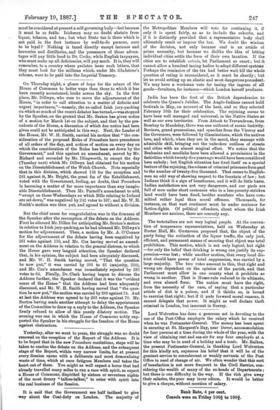On Thursday night, a gleam of hope for the return
of the House of Commons to better ways than those to which it has been recently accustomed, broke across the sky. In the first place, Mr. Dillwyn, who rose to move the adjournment of the House, "in order to call attention to a matter of definite and urgent importance,"—namely, the so.called Irish jury-packing on which so much of the recent debates has turned,—was stopped by the Speaker, on the ground that Mr. Sexton has given notice of a motion for March let on the subject, and that by the pre- cedents of the House, a discussion of which due notice had been given could not be anticipated in this way. Next, the Leader of the House, Mr. W. H. Smith, carried his motion that "the con- sideration of the proposed Rules of Procedure have precedence of all orders of the day, and notices of motion on every day on which the consideration of the Rules has been set down by the Government," and this against an amendment, moved by Mr. Richard and seconded by Mr. Illingworth, to except the day (Tuesday next) which Mr. Dillwyn had obtained for his motion on the Disestablishment of the Welsh Church. Note especially that in this division, which showed 158 for the exception and 261 against it, Mr. Bright, the great foe of the Establishment, voted with the Government, feeling, no doubt, that Procedure is becoming a matter of far more importance than any imagin- able Disestabliehment. Then Mr. Parnell'e amendment to add, ' except on those Wednesdays on which Bills relating to Ireland are set down," was negatived by 242 votes to 107; and Mr. W. H. Smith's motion was then put, and agreed to without a division.


































 Previous page
Previous page